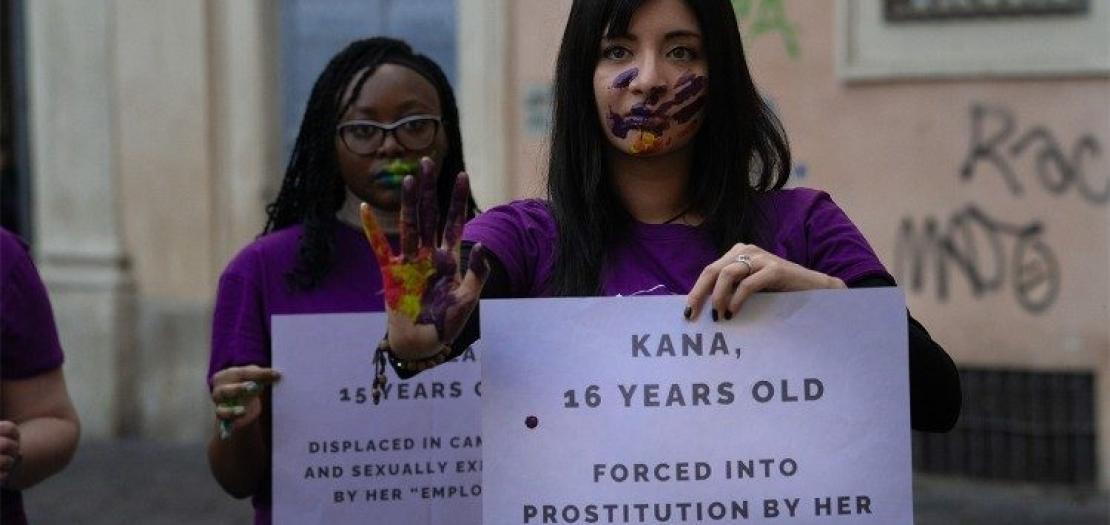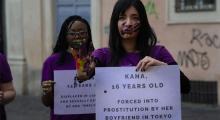Issued by the Catholic Center for Studies and Media - Jordan. Editor-in-chief Fr. Rif'at Bader - موقع أبونا abouna.org

30 July marks the United Nation’s World Day Against Trafficking in Persons. The theme this year is "Human trafficking is Organized Crime - End the Exploitation", focusing on the joint efforts needed by law enforcement, the criminal justice system, and society to have a victim-survivors centered approach to ending and preventing further exploitation.
Based on statistics from United Nations Office on Drugs and Crime (UNODC):
· Between 2019 and 2022, the number of victim-survivors of forced labor worldwide increased by 47 per cent.
· In 2022, 61 per cent of people trafficked were female – 39 per cent adults and 22 per cent girls.
· UNODC reported that at least 162 nationalities were trafficked to 128 countries, with the majority (31 per cent) being citizens of African countries.
· Displacement caused by conflict and climate change are factors in trafficking patterns.
The UNODC highlighted that “more and more victims are being trafficked every year, across greater distances, with greater violence, for longer periods of time and for greater profit.”
The UN reported that though the numbers from 2020 to 2023 were estimated around 200,000 victim-survivors worldwide, the “actual number of unreported cases is believed to be significantly higher.” One of the big drivers of the exploitation of people is organzied crime networks, which use forced labor and coercion into criminal activities.
According to the UN, the criminal justice system’s response continues to fall short in halting this “rapidly evolving crime.” To remedy this, the organization calls for stricter laws, bettering cross-border cooperation and use of technology to detect and take down trafficking networks, among other initiatives.
On the occasion of the day dedicated to ending human trafficking, the Pope John XXIII Community published its 2025 report, "Trafficking: Understanding its causes and protecting exploited people in the murky side of migration".
The report showed that more than 50 million people are currently being exploited around the world and the number of victim-survivors rises by about 800,000 people each year.
The President of the community, Matteo Fadda, reiterated the UN’s call for government officials to take action to prevent further trafficking. He stressed how important it is to recognize where recruitment happens—online, in person, on migration routes—in order to prevent it.
“Our experience shows that prompt intervention during disembarkation and along migration routes, as we do in Greece, is essential to protect the most vulnerable”, Fadda explained.
Also marking the day with their 2024 report, the international network of religious sisters Talitha Kum. In the last year, they were able to reach 939,185 people across the globe—a 20 per cent increase from 2023. Their work through the development of prevention initiatives, strengthened collaborations, increased support for victim-survivors, and more effective advocacy helped over 420,000 women and children (boys and girls) and enabled the sisters to connect with more people and draw more attention to this modern-day form of slavery.
Their report highlights that last year Talitha Kum provided support to almost 47,000 victim-survivors in the form of safe shelter, trauma-informed care, legal aid, and skills development. Prevention initiatives were also up 11 per cent as they helped some 690,356 people.
Sr. Abby Avelino, MM, coordinator of Talitha Kum, explained that despite the challenges of armed conflicts in areas around the world, the organization has expanded its services to those in need. “Our advocacy effort strengthened across every region. From Ghana to South Korea, and from Brazil to Ireland, Talitha Kum worked to influence public policy, drawing on the wisdom of survivors and local communities.”







